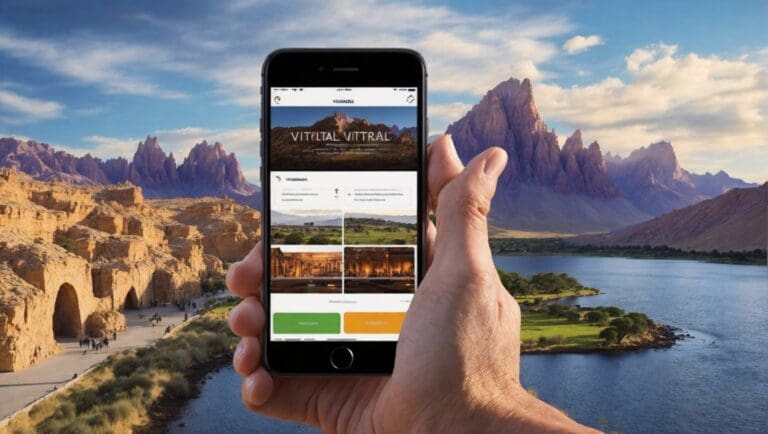Best Platform for a Virtual Trip Organizing
Virtual travel has exploded in popularity, especially over the past few years. While nothing can truly replace visiting a destination in real life, the best virtual travel apps come close by providing immersive and engaging experiences. The best virtual travel apps leverage innovative technology to make users feel like they are really exploring new places.
When it comes to planning a virtual trip, selecting the right platform for a virtual trip is crucial. With so many options available, deciding which one to use can be overwhelming. The platform you choose will determine the overall experience of your virtual trip, including the ease of planning, the level of interaction, and the quality of the virtual tours.
With the right app and equipment, you can fully immerse yourself in virtual travel from the comfort of your own home. The best virtual travel apps allow you to do everything from interactively tour famous sites to preview hotels before booking. When searching for the best virtual travel apps, look for those with high-quality VR capabilities for the most realistic experiences.
Before you start planning your virtual trip, take some time to research the different platforms available. Consider your goals for the trip and what features are important to you. For example, if you want to plan a trip with a group of friends, look for a platform that allows for easy collaboration and communication. If you want to experience virtual tours with a high level of interactivity, look for a platform that offers 360-degree views and live guides.
Understanding the Importance of Choosing the Right Platform for a virtual Trip
When it comes to organizing a virtual trip, choosing the right platform is crucial to ensure a successful and engaging experience for your participants. In this section, we will discuss the importance of selecting the right platform and provide you with some planning and best practices to help you make the right choice.
Planning and Research
Before selecting a platform for your virtual trip, it is essential to do some planning and research. You should consider the following factors:
- Budget: Determine how much you are willing to spend on the platform and choose a platform that fits your budget.
- Features: Look for a platform that offers the features you need to achieve your goals. For example, if you want to provide a virtual tour of a museum, you need a platform that supports 360-degree video.
- Audience: Consider the needs and preferences of your audience. For example, if your audience is primarily made up of older adults, you may want to choose a platform that is easy to use and navigate.
- Technical Requirements: Determine the technical requirements of the platform, such as internet speed and device compatibility, and ensure that your participants can access the platform without any issues.
Best Practices
Here are some best practices to keep in mind when selecting a platform for your virtual trip:
- Choose a user-friendly platform: Select a platform that is easy to use and navigate, even for participants who are not tech-savvy.
- Ensure accessibility: Ensure that the platform is accessible to all participants, including those with disabilities.
- Test the platform: Test the platform before the trip to ensure that it works as expected and that all features are functioning correctly.
- Provide technical support: Provide technical support to participants in case they encounter any issues during the trip.
- Engage your audience: Choose a platform that allows you to engage your audience through interactive features such as polls, quizzes, and chat.
In conclusion, selecting the right platform is crucial to the success of your virtual trip. By doing proper planning and research and following best practices, you can ensure that your participants have an engaging and memorable experience.
Factors to Consider When Choosing a Platform for a Virtual Trip
When selecting a platform for your virtual trip, there are several factors you need to consider. These factors will help you choose the right platform that meets your needs and provides your audience with the best experience possible. Here are some of the key factors to consider:
Connectivity and Engagement
One of the most important factors to consider when choosing a virtual trip platform is connectivity and engagement. You want a platform that provides your audience with a seamless and interactive experience. This means that the platform should have high-quality video and audio capabilities and tools for engagement, such as chat rooms, polls, and Q&A sessions.
Accessibility and Accommodation
Another important factor to consider when choosing a virtual trip platform is accessibility and accommodation. You want a platform that is accessible to all your audience members, regardless of their location or abilities. This means that the platform should be easy to use and navigate and provide accommodations for those with disabilities or language barriers.
Virtual Events and Networking Opportunities
Finally, you want to choose a platform that provides virtual events and networking opportunities. This means that the platform should have tools for hosting virtual events such as conferences, workshops, and webinars. It should also provide networking opportunities such as virtual meetups and social events.
| Factors to Consider | Description |
|---|---|
| Connectivity and Engagement | High-quality video and audio capabilities and tools for engagement, such as chat rooms, polls, and Q&A sessions. |
| Accessibility and Accommodation | Easy to use and navigate, provide accommodations for those with disabilities or language barriers. |
| Virtual Events and Networking Opportunities | Tools for hosting virtual events such as conferences, workshops, and webinars. Provide networking opportunities such as virtual meetups and social events. |
In summary, when choosing a virtual trip platform, you need to consider several factors, such as connectivity and engagement, accessibility and accommodation, and virtual events and networking opportunities. By considering these factors, you can choose a platform that meets your needs and provides your audience with the best experience possible.
Comparing Different Virtual Trip Platforms
When it comes to selecting a virtual trip platform, there are several options available. Each platform has its own features and benefits that can be useful for organizing your virtual trip. This section will compare different virtual trip platforms and their capabilities.
Webinars and Video Conferencing
Webinars and video conferencing platforms are great for virtual trips that require real-time interaction and communication. Some popular platforms for this purpose include Zoom, Google Meet, and Microsoft Teams.
Zoom is a widely used platform for webinars and video conferencing. It offers features like screen sharing, breakout rooms, and recording options. Google Meet is another popular platform that offers similar features, including screen sharing and recording options. Microsoft Teams is also a great option for webinars and video conferencing, especially if you are already using other Microsoft products like Office 365.

Livestream and Virtual Tours
Livestream and virtual tour platforms are great for virtual trips that require a more immersive experience. Some popular platforms for this purpose include YouTube Live, Facebook Live, and Instagram Live.
YouTube Live is a great platform for live-streaming virtual tours. It offers features like chat, live captions, and analytics. Facebook Live is another popular platform for live streaming, especially if you have a large following on Facebook. Instagram Live is also a great option for live streaming, especially if you have a large following on Instagram.
Choosing the Right Platform for Your Needs
When it comes to organizing a virtual trip, choosing the right platform is crucial to ensure a smooth and hassle-free experience. Here are some key factors to consider when selecting a platform that meets your needs.
Trip Planning and Itinerary
One of the most important aspects of a virtual trip is the itinerary. You need a platform that allows you to plan and customize your trip according to your preferences. Look for a platform that comprehensively lists activities, attractions, and detailed information about each. This will help you create an itinerary that suits your interests and schedule.
Booking and Registration
Booking and registration are another critical aspect of a virtual trip. You need a seamless platform that allows you to book and pay for your activities and accommodations. Look for a platform that offers a simple and secure payment process and a user-friendly interface. This will ensure that you can complete your bookings quickly and easily.
Virtual Assistants and Locals
Virtual assistants and locals can make a huge difference when it comes to planning and organizing your virtual trip. Look for a platform that provides access to virtual assistants who can help you with your bookings, itinerary planning, and other aspects of your trip. You should also look for a platform that connects you with locals who can provide insider tips and recommendations.
Relevant Platforms
When it comes to selecting a platform for your virtual trip organizing, there are several options to consider. TravelPerk is a popular platform that offers a comprehensive range of travel services, including flights, hotels, and car rentals. Airbnb is another popular platform that provides access to unique and affordable accommodations around the world.
In conclusion, choosing the right platform for your virtual trip organizing is crucial to ensure a smooth and enjoyable experience. Consider your needs carefully, and look for a platform that provides comprehensive trip planning and itinerary options, easy booking and registration, and access to virtual assistants and locals. With the right platform, you can create a memorable virtual trip that meets your needs and exceeds your expectations.
The Future of Virtual Travel
As the world becomes increasingly digital, virtual travel is becoming more popular. While it can never replace the experience of physically visiting a place, virtual travel has many advantages. In this section, we will explore some of the ways virtual travel is changing the industry.
Virtual Field Trips and Photo Contests
Virtual field trips and photo contests are becoming more popular as schools and organizations look for ways to provide educational experiences in a safe and cost-effective manner. With virtual field trips, students can learn about different cultures, historical events, and natural wonders without ever leaving the classroom. Photo contests allow travelers to share their experiences and connect with others who share their passion for travel.
Virtual Conferences and Edinburgh Safari
Virtual conferences are becoming more common as businesses look for ways to reduce travel costs and increase productivity. With virtual conferences, attendees can participate from anywhere in the world, making connecting with colleagues and partners easier. Edinburgh Safari is a great example of a virtual conference that provides an immersive experience for attendees.
Pandemic and Virtual Assistants
The pandemic has accelerated the adoption of virtual travel. With many people unable to travel due to restrictions, virtual travel has become a way to explore the world from the comfort of your own home. Virtual assistants are also becoming more common, providing travelers with personalized recommendations and assistance.
Hotels, Flights, and Event Organizers
Hotels and airlines are also getting in on the virtual travel trend. Some hotels offer virtual property tours, allowing travelers to explore before they book. Airlines are offering virtual flights, allowing travelers to experience the thrill of flying without leaving the ground. Event organizers are also using virtual platforms to host conferences and other events.
In conclusion, virtual travel is changing the way we explore the world. While it can never replace the experience of physically visiting a place, it provides a cost-effective and safe alternative. As technology continues to advance, we can expect virtual travel to become even more immersive and engaging.







